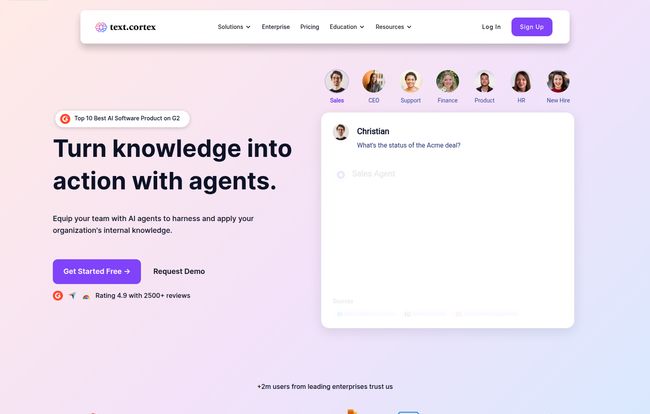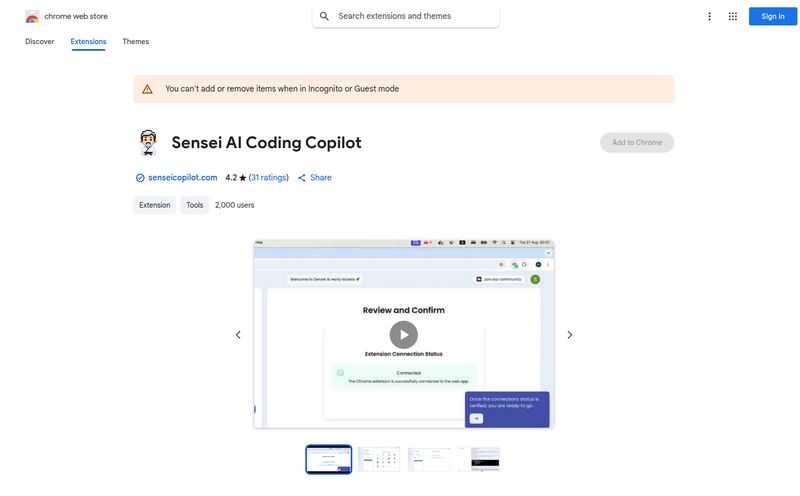If you're in the SEO or content game, your inbox and social feeds are probably drowning in a sea of "revolutionary" AI tools. Every single one claims to be the next big thing, the ultimate solution, the answer to all our content prayers. Most of the time, I just roll my eyes. It's usually the same old GPT wrapper with a new coat of paint.
But every now and then, something catches my eye. Something that feels a bit... different. That's what happened with TextCortex. I kept hearing whispers about it, not just as a writer, but as a complete AI 'companion'. A tool that doesn't just spit out words, but actually understands your work, your data, your entire workflow. So, I decided to push past the marketing fluff and see if there was any real substance there. And honestly? I'm kind of impressed.

Visit TextCortex
So, What is TextCortex, Really?
Calling TextCortex just an "AI writer" is like calling a Swiss Army knife just a knife. It’s so much more. At its core, yes, it helps you write. But its real power lies in how it acts as a central brain for your knowledge. Imagine having a super-smart research assistant who has read every document, email, and note your company has ever produced. Now imagine that assistant is available to you on any website or app you use, ready to provide context, summarize information, or automate a tedious task. That’s the vibe TextCortex is going for.
It’s designed to be an enterprise knowledge management platform that turns all that scattered data—the stuff in your Google Drive, your Notion pages, your Slack channels—into something you can actually use. It’s less about replacing you and more about giving you a powerful copilot for your creative and analytical processes.
The Standout Features That Genuinely Grabbed My Attention
This isn't just a list of features from their homepage. This is the stuff that made me, a jaded SEO professional, actually sit up and take notice.
Customizable AI Agents You Can Actually Build
This is the big one for me. We're all getting pretty good at writing prompts for ChatGPT, but TextCortex takes it a step further. You can build your own custom 'AI Agents'. Think of them as specialized AI workers trained on your specific data and for your specific tasks. For example, you could create a 'Marketing Persona Agent' that’s been fed all your brand guidelines and target audience research. Anytime you need marketing copy, you just call on that agent, and it already knows your tone of voice, your no-go words, and the pain points of your ideal customer. It's a huge time-saver and a massive leap towards truly personalized AI assistance.
The 'Everywhere You Work' Integration is No Joke
I can't stand being forced into a single app or tab to use a tool. My workflow is a chaotic mix of Google Docs, Asana, Slack, and about a dozen other open tabs. TextCortex gets this. They claim to integrate with over 30,000+ apps and sites through a browser extension and a desktop app. And in my experience, it actually works. Having your AI companion available right there in the text editor you're already in—without having to copy-paste back and forth—is a small thing that makes a huge difference to productivity. It feels less like using a separate tool and more like your computer just got a brain upgrade.
Turning Scattered Data into Smart Decisions
Here’s where the enterprise angle really shines. We all have that one shared drive that’s a complete mess. A digital graveyard of old reports, meeting notes, and project plans. TextCortex can connect to that chaos and make sense of it. Need to know the key takeaways from all client feedback in Q3? Just ask. Want to cross-reference a new product proposal against last year's market research? It can do that. This transforms a passive data storage system into an active, searchable knowledge base. It's a pretty powerful concept for any team drowning in information.
My Hands-On Experience: The Good, The Bad, and The AI
Alright, no tool is perfect. Let's get into the nitty-gritty of what it's actually like to use TextCortex day-to-day.
First, the good stuff. The free plan is genuinely useful. It’s not just a crippled trial; you get a certain number of 'creations' per day, which is more than enough to get a feel for the tool and even use it for light tasks. I'm also a big fan of the multi-language support. With support for over 25 languages, it's a fantastic asset for international teams and global SEO campaigns. And their public stance on being a Secure & Responsible AI gives me a bit more peace of mind, especially when you start thinking about connecting it to sensitive company data.
Now, for the caveats. One thing to know is that account sharing is not allowed. This is pretty standard for SaaS products, but for small teams or freelancers trying to stretch a budget, it's something to be aware of. You can't just buy one seat and have three people use it. Also, and this shouldn't come as a surprise, the most powerful features—like the advanced AI agents and unlimited creations—are tucked away in the paid subscription plans. The free version is a great taste, but the full meal will cost you.
What's the Deal with TextCortex Pricing?
This is the question on everyones mind, right? How much is this going to set me back? As of writing this, TextCortex has a tiered pricing structure that starts with the aforementioned free plan. After that, there are several paid tiers aimed at individuals, small teams, and larger enterprises.
Because these prices can change, I won't list the exact numbers here—they'd be outdated in a week. Your best bet is to head straight to the source.
"I always recommend checking the official pricing page on the TextCortex website for the most current plans and features. They lay it all out pretty clearly."
What I will say is that the value proposition seems fair. You're not just paying for a word generator; you're paying for a productivity and knowledge management system. When you factor in the time saved on research, writing, and repetitive tasks, the monthly cost could easily pay for itself.
TextCortex vs. The Big Guys like ChatGPT and Copilot
So, how does this stack up against the giants? It's a question I've been asking myself, and it's even in their own FAQ section. Here's my take.
- ChatGPT is the brilliant generalist. It's an incredible tool for brainstorming, casual conversation, and generating content on just about any topic under the sun. But its knowledge is general; it doesn't know anything about your business specifically.
- Microsoft Copilot is the ecosystem specialist. It's being woven deeply into the fabric of Windows and Microsoft 365. If your entire life revolves around Word, Excel, and Teams, it's going to be a powerhouse.
- TextCortex is the personalized specialist. Its unique selling point is its ability to integrate with your custom data and work across a vast landscape of third-party apps. It’s for the user who wants an AI that adapts to their unique world, not just the one Microsoft built. It's about bringing the AI to where you work, not the other way around.
Frequently Asked Questions
Is TextCortex free to use?
- Yes! TextCortex offers a free plan that comes with a daily allotment of creations. It's a great way to test out the core features before committing to a paid plan.
How many languages does TextCortex support?
- It supports over 25 languages, making it a really versatile tool for global teams and content creators working in multiple markets.
Can I share my TextCortex account with my team?
- No, account sharing is against their terms of service. Each user needs their own license, but they do have team-based plans available.
How does TextCortex handle data privacy?
- They have a strong focus on being a "Secure & Responsible AI." They emphasize that you have control over your data, and they are built with privacy and compliance in mind, which is especially important for enterprise customers.
Is TextCortex better than ChatGPT?
- It's not about being "better," it's about being different. If you need a personalized AI that learns from your specific documents and integrates everywhere, TextCortex has a clear advantage. For general-purpose creative writing or brainstorming, ChatGPT is still fantastic.
Final Thoughts: Is TextCortex Actually Worth Your Time?
After spending some real time with it, my answer is a solid yes... for the right person. If you're a solo blogger who just needs to churn out articles, it might be overkill. But if you're a marketer, a small business owner, or part of a larger enterprise team, the value proposition is huge.
The ability to unify your scattered knowledge and automate workflows with custom-trained AI agents is, for me, a glimpse into the future of work. It’s a move away from generic AI and towards a truly personal, integrated assistant. TextCortex isn't just another tool in the ever-growing pile; it's a smart, well-designed platform that seems to genuinely understand the modern workflow. It has its quirks, sure, but it's one of the few AI tools lately that has me genuinely excited for what's next.



